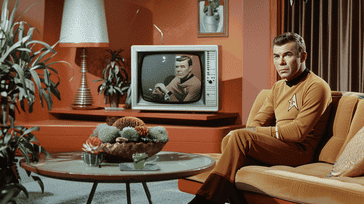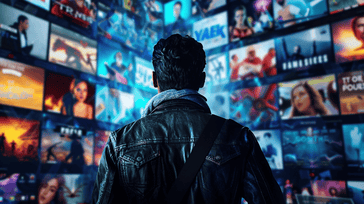
Welcome to our trip down memory lane as we explore some of the most iconic TV series from the past. In this article, we will relive those unforgettable moments and dive into the world of television entertainment. From timeless classics to groundbreaking shows, television has always been a source of entertainment, capturing our hearts and imaginations.
Key Takeaways:
- Television has played a significant role in shaping our cultural landscape.
- Classic TV shows evoke nostalgia and fond memories, capturing the hearts of audiences.
- We will discuss the evolution of television entertainment and its impact on the entertainment landscape.
- Binge-watching culture has become a phenomenon with the rise of streaming services.
- Streaming services have revolutionized the way we watch television, giving us the freedom to enjoy our favorite shows anytime, anywhere.
The Evolution of Television Entertainment
Television entertainment has come a long way over the years, transforming from traditional broadcast channels to the advent of streaming services. This evolution has changed the way audiences consume content, providing a wide range of options and flexibility.
One significant factor in the evolution of television entertainment is the rise of streaming services. Platforms such as Netflix, Hulu, and Amazon Prime Video have revolutionized the way we watch TV shows and movies. These services offer a vast library of content that can be accessed anytime, anywhere, making it easier for viewers to binge-watch their favorite shows.
Streaming Services
Streaming services have gained tremendous popularity due to their convenience and extensive content libraries. With the ability to stream shows directly to their devices, viewers no longer have to rely solely on cable channels or scheduled programming. This has led to a shift in consumer behavior and preferences, as more people opt for streaming services over traditional cable subscriptions.
Moreover, streaming services have opened up opportunities for original content production, resulting in high-quality shows and movies that often rival those produced by cable channels. This has created fierce competition in the entertainment industry, with streaming services investing heavily in original programming to attract and retain subscribers.
Movies and Reality TV
In addition to streaming services, movies and reality TV have also played a significant role in shaping the evolution of television entertainment. Movies have always been a popular form of entertainment, but with the accessibility of streaming platforms, viewers can now watch their favorite movies at home or on the go.
Reality TV shows have also gained immense popularity, offering a unique form of entertainment that combines elements of drama, competition, and real-life scenarios. These shows have captivated audiences worldwide, providing a glimpse into the lives of ordinary people or showcasing talent in various fields. Reality TV has become a staple in television programming, attracting viewers from a diverse range of demographics.
Cable Channels
While streaming services have disrupted the traditional television landscape, cable channels continue to play a vital role in the entertainment industry. Many cable networks produce high-quality shows and offer specialized content that caters to niche audiences.
The competition between cable channels and streaming services has resulted in a diverse and eclectic range of content for viewers to choose from. Audiences now have more options than ever before, whether they prefer the convenience of streaming services or the curated programming of cable channels.
In conclusion, the evolution of television entertainment has seen significant changes, driven by the rise of streaming services, the impact of movies and reality TV, and the continued relevance of cable channels. As technology continues to advance and viewer preferences evolve, it will be fascinating to see how television entertainment further transforms in the future.
The Rise of Binge-Watching Culture

In the age of streaming services, binge-watching has taken the world by storm. Gone are the days of waiting for the next episode to air on traditional broadcast television. With just a few clicks, viewers can now consume entire seasons of their favorite TV shows in one sitting.
This phenomenon has revolutionized the way we consume television. No longer bound by the constraints of weekly episodes, binge-watching allows us to immerse ourselves in captivating narratives and explore complex character arcs without the interruption of commercials or waiting periods. It's a TV lover's dream come true.
The Pros of Binge-Watching
- Uninterrupted Viewing: Binge-watching eliminates the need to wait for the next episode, allowing viewers to experience a seamless and uninterrupted viewing experience.
- Emotional Investment: Engaging in a binge-watching session allows us to fully immerse ourselves in the storyline and connect more deeply with the characters.
- Flexible Schedule: With binge-watching, viewers have the freedom to create their own TV schedule, deciding when and how they want to consume their favorite shows.
The Cons of Binge-Watching
- Loss of Anticipation: With binge-watching, the excitement of looking forward to the next episode can be diminished, as viewers no longer have to wait for cliffhangers to be resolved.
- Lack of Social Interaction: Binge-watching can be a solitary activity, reducing opportunities for shared viewing experiences and discussions with friends and family.
- Potential Health Effects: Sitting for long periods while binge-watching can lead to a sedentary lifestyle, potentially impacting our overall health and well-being.
Streaming services have played a pivotal role in fueling the rise of binge-watching culture. Platforms such as Netflix, Hulu, and Amazon Prime Video have made entire seasons of popular TV shows available at our fingertips, catering to our desire for instant gratification and personalized viewing experiences.
As binge-watching continues to gain popularity, it's essential to recognize the benefits and drawbacks of this trend. While it offers a convenient and immersive way to enjoy our favorite TV shows, it's important to maintain a balance and consider our overall well-being.
Nostalgia: The Appeal of Classic TV
Classic TV shows have a timeless quality that continues to captivate audiences and evoke feelings of nostalgia. These iconic series hold a special place in our hearts, reminding us of simpler times and providing a comforting escape from the present. Whether it's the memorable characters, captivating storylines, or the sense of familiarity, classic TV has an enduring appeal that transcends generations.
One of the reasons why classic TV shows remain so beloved is their ability to transport us to a different era. Take, for example, "Friends," a show that depicted the lives of six friends navigating their twenties in New York City during the 1990s. The series not only captured the essence of that decade but also explored universal themes of friendship, love, and self-discovery. Watching "Friends" today feels like revisiting a bygone era, and yet, the humor and relatability of the characters remain as relevant as ever.
Another aspect that adds to the appeal of classic TV is the familiarity it brings. For many of us, growing up watching shows like "The Brady Bunch," "I Love Lucy," or "M*A*S*H" was a formative part of our childhood. These shows become ingrained in our memories and become a part of who we are. Revisiting them as adults allows us to relive those moments and share them with future generations.
Classic TV shows also played a crucial role in shaping our viewing habits through TV schedules. Back in the day, viewers would eagerly anticipate the airing of their favorite shows, ensuring they didn't miss a single episode. The anticipation built up as the airtime approached, and families would gather around the television, creating a shared experience. The TV schedule became a part of our daily routine, and we would eagerly plan our evenings around it.
"Good night, John Boy." - John Walton Sr. (The Waltons)
The Power of TV Schedules
While streaming services have transformed the way we consume TV shows, there is still something magical about following a TV schedule. It adds a sense of anticipation and excitement to the viewing experience, as we wait for our favorite shows to air at a specific time. It also provides a shared cultural experience, as people tune in simultaneously, discussing the latest episode the next day.
Here is a glimpse of a typical TV schedule from the past:
| Time | Network | Show |
|---|---|---|
| 8:00 PM | NBC | The Cosby Show |
| 8:30 PM | NBC | Family Ties |
| 9:00 PM | CBS | Dallas |
| 10:00 PM | ABC | Magnum, P.I. |
TV schedules allowed us to plan our evenings, ensuring that we didn't miss our favorite shows. It created a sense of community as friends and family members gathered around the TV, sharing laughter, tears, and suspense together.
While the way we consume television has changed with the rise of streaming services and on-demand viewing, the enduring appeal of classic TV and the nostalgia it evokes remains unmatched. These shows have left an indelible mark on popular culture and continue to be treasured by fans around the world. So, sit back, relax, and let the nostalgia wash over you as you revisit the iconic series that captivated audiences then and continue to do so now.
Conclusion

In conclusion, television entertainment has played a significant role in shaping our cultural landscape. Throughout the years, we have witnessed the evolution of the TV industry, from classic shows that have stood the test of time to the rise of streaming services that have revolutionized the way we watch television.
Looking back at those iconic series from the past, we can't help but feel a sense of nostalgia. These shows have not only entertained us but have also transported us to different eras, capturing our imaginations and leaving a lasting impact on popular culture.
As we continue to embrace the world of television, let's cherish and celebrate the power of this medium. Whether it's revisiting old favorites or discovering new binge-worthy series, television continues to play a vital role in providing us with entertainment, escapism, and shared moments of cultural significance.
FAQ
What are some iconic TV series from the past?
Some iconic TV series from the past include "Friends," "The Sopranos," "Breaking Bad," "The Simpsons," and "Seinfeld," among many others.
How has television entertainment evolved over the years?
Television entertainment has evolved from traditional broadcast channels to the advent of streaming services. We now have access to a wide variety of content from movies, reality TV, and cable channels.
What is binge-watching, and how has it become popular?
Binge-watching refers to the practice of watching multiple episodes or an entire season of a TV show in one sitting. With the rise of streaming services, viewers now have the option to watch their favorite shows at their own pace, leading to the popularity of binge-watching.
Why do classic TV shows hold such appeal?
Classic TV shows evoke feelings of nostalgia and fond memories. They remind us of a simpler time and often feature timeless stories and beloved characters that continue to captivate audiences.
How have TV schedules played a role in our viewing habits?
TV schedules used to dictate when and what shows we could watch. They created anticipation and the shared experience of watching a show at a specific time. However, with the rise of streaming services, viewers now have the freedom to watch their favorite shows whenever they want, making TV schedules less significant.







